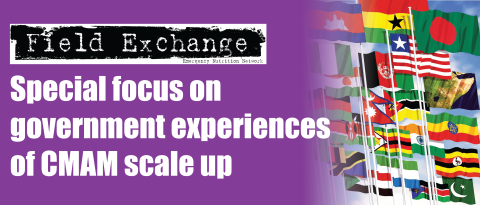En-net update, March-May 2012
By Tamsin Walters, en-net moderator

Thirty-six questions were posted on en-net in the three months March to May inclusive, eliciting 176 replies. In addition 25 job vacancies were posted.
Recent discussions have included: Mid Upper Arm Circumference (MUAC) changes in pregnancy and ongoing research into what are the most appropriate thresholds to use for pregnant and lactating mothers in programmes to treat acute malnutrition and how they correlate with adverse outcomes, dilemmas of whether to use weight-forheight or MUAC to diagnose acute malnutrition and the potential biases of the two measures in different population groups, the challenges inherent in attempting causal analyses of acute malnutrition, and considerations of how to continue to promote breastfeeding in community-based management of acute malnutrition (CMAM) programmes.
An interesting discussion arose from a situation in Somalia where reports came in of mothers "starving" their children in order to benefit from nutritional treatment and a protection ration being provided alongside programmes to treat acute malnutrition. This is not an unfamiliar scenario and has been reported in several countries, with greater or less emphasis, in many programmes implemented in crisis situations. The Nutrition Cluster in Somalia is trying to gather further evidence to establish how significant and widespread the problem is. Meanwhile, performance monitoring data from one programme in Somalia has shown an increase in relapses in the last three months from 8% to 17%, which could be linked to the same issue. Suggestions and solutions were sought on how to address this situation.
Discussants advised enhancing community mobilisation and counselling for both mothers and fathers, as well as engaging other influential community leaders. Contributors cited successful examples of both individual counselling as well as group discussions in programmes in Uganda, South Sudan, Ethiopia, Niger, Haiti and Bangladesh.
Despite these examples of successful approaches to address the immediate issues, it was agreed that ‘starving’ of children was most likely symptomatic of a much greater underlying problem of food insecurity. "These are usually decisions made under conditions of real stress which aid workers, agencies, donors and planners have never personally faced and often to not consider"1.
A situation where people are taking such desperate measures to access basic commodities suggests a large unmet need in terms of general rations and basic household food needs. It is a survival strategy for the family.
Excerpts from a letter from Nelson Mandela on World Food Day, September 2004, was quoted to bring home the real issues people are facing and the decisions they are making in such situations: "Hunger is an aberration of the civilized world... Families are torn asunder by the question of who will eat. As global citizens, we must free children from the nightmare of poverty and abuse and deprivation. We must protect parents from the horrifying dilemma of choosing who will live.2"
The discussion concluded with a consensus that mothers should never be shamed or punished in nutrition programmes, but efforts should be made to understand and help them. Mothers do not harm their children unthinkingly; they are facing desperate life and death decisions for their families. Our work is to try to understand and respect the reality of their day to day lives and adjust our programmes accordingly to meet their needs.
To view the full discussion, go to http://www.en-net.org.uk/question/717.aspx
To join any discussion on en-net, share your experience or post a question, visit www.en-net.org.uk
Contributions from Fortune Maduma, Martha N, Peris Mwaura, Yara Sfeir, Chantal Autotte Bouchard, Mark Myatt, Leo Anesu Matunga, Alex Mokori, Michael Golden, Nikki Blackwell and others.
Imported from FEX website


